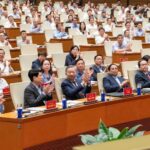The conference will be attended by Party and State leaders, as well as leaders of central ministries, departments, and localities. The General Secretary, To Lam, will deliver an important speech at the conference.
The conference will be held in a hybrid format, connecting the main venue at the Diên Hồng Hall of the National Assembly with other venues of ministries, sectors, localities, agencies, and organizations. It will be broadcast live on VTV1 and VOV1 channels.
Before the conference, at the main venue of the National Assembly, delegates will visit the exhibitions “Achievements in Law Building and Enforcement” and “Achievements in Private Economic Development,” along with booths showcasing products of private enterprises.
According to the agenda, at the conference, Prime Minister Pham Minh Chinh will present a special topic on “The Key and Core Contents of Resolution No. 68-NQ/TW, dated May 4, 2025, by the Politburo on Private Economic Development and the Plan for Implementing Resolution No. 68-NQ/TW.”
National Assembly Chairman Tran Thanh Man will present a special topic on “The Key and Core Contents of Resolution No. 66-NQ/TW, dated April 30, 2025, by the Politburo on Innovating the Work of Building and Enforcing Laws to Meet the Requirements of the New Era, and the Plan for Implementing Resolution No. 66-NQ/TW.”
Following that, Head of Propaganda and Publicity and Mass Mobilization Nguyen Trong Nghia will deliver a speech to receive the guidance of the General Secretary and provide directions for the propagation, dissemination, and implementation of Resolution No. 66-NQ/TW and Resolution No. 68-NQ/TW of the Politburo.

Resolution No. 66-NQ/TW on Innovating Law Building and Enforcement
Resolution No. 66-NQ/TW sets the goal that by 2030, Vietnam will have a democratic, equitable, harmonious, and transparent legal system that is publicly accessible and effectively enforced. It aims to provide a legal basis for the normal, continuous, and smooth operation of state agencies after organizational restructuring, address bottlenecks in practice, and pave the way for development. By 2030, Vietnam envisions becoming a developing country with a modern industrial base and upper-middle-income status.
By 2025, the resolution aims to essentially remove bottlenecks caused by legal regulations. By 2027, the amendment, supplementation, and issuance of new legal documents will be completed to ensure a synchronous legal basis for the operation of the state apparatus according to the three-tier model. By 2028, the legal system regarding investment and business will be perfected, contributing to improving Vietnam’s investment environment to be among the top three in ASEAN.
The resolution also sets a vision for 2045, aiming for a high-quality and modern legal system that meets international standards and suits the country’s reality. It emphasizes the strict observance of the Constitution and laws, making them the standard of conduct for all members of society. Additionally, it focuses on modern state governance with a streamlined, efficient, and effective state apparatus, meeting the requirements for rapid and sustainable national development. By 2045, Vietnam aspires to become a developed, high-income country following the socialist orientation.

Resolution No. 68-NQ/TW sets the goal that by 2030, the private economic sector will be the most important driving force of the national economy and the pioneer in scientific and technological development, innovation, and digital transformation. It aims to contribute to the successful implementation of Resolution No. 57-NQ/TW, dated December 22, 2024, by the Politburo, along with other guidelines and policies of the Party.
The resolution targets having 2 million businesses operating in the economy, with 20 businesses per thousand people. There should be at least 20 large enterprises participating in the global value chain.
The average growth rate of the private sector is expected to reach about 10-12% per year, higher than the economy’s growth rate, contributing to about 55-58% of GDP and about 35-40% of the total state budget revenue. It aims to provide employment for about 84-85% of the total labor force, with labor productivity increasing by about 8.5-9.5% per year.
In terms of technology and innovation, the resolution sets the goal of having the private sector’s capacity in these areas among the top three in ASEAN and the top five in Asia.
Looking towards 2045, the resolution envisions a dynamic, robust, and sustainable private economic sector that proactively participates in global production and supply chains, with high competitiveness in the region and internationally. It aims to have at least 3 million businesses operating in the economy, contributing over 60% of GDP.
“Overcoming Challenges: Unleashing the Potential of Vietnam’s Private Sector”
“During the National Conference on May 18, Prime Minister Pham Minh Chinh pointed out a slew of shortcomings hindering the development of the private sector, ranging from institutional and cognitive aspects to implementation. Despite accounting for 50% of GDP, this sector still faces a “double bind” in terms of legal framework, credit, and connectivity.”
“Revolutionizing Governance for a Soaring Nation”
“General Secretary To Lam penned an article titled, ‘Breaking Through with Institutions and Laws for a Nation’s Ascension’. He emphasizes that superior institutions and laws, aligned with the developmental needs and aspirations of the people, are paramount to a nation’s success. Thus, to propel our country forward, we must vehemently reject any limitations or shortcomings within our institutions and laws. We cannot compromise with any weaknesses in policy design, legislation drafting, or implementation. The Government Portal is honored to present the entirety of Comrade General Secretary’s insightful article.”







![[Photo Essay]: Experts, Managers, and Businesses Unite to Forge a Path Towards Sustainable Green Industry](https://xe.today/wp-content/uploads/2025/07/z678592918-218x150.jpg)












